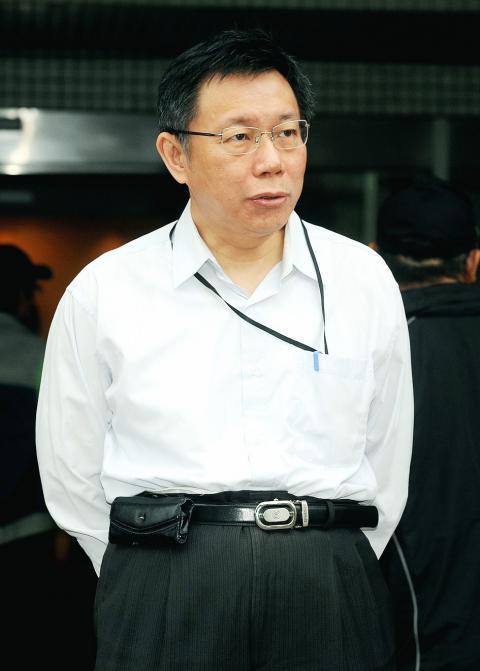The Control Yuan has decided to impeach Ko Wen-che (柯文哲), the former head of National Taiwan University Hospital’s organ transplant task force, because the hospital used HIV-infected organs in four transplants last year. The Control Yuan passed a motion submitted by members Teresa Yin (尹祚芊) and Li Ful-dien (李復甸) to impeach Ko for dereliction of duty by an 8-2 vote, but it remains unclear if the move will have any tangible effect on Ko’s job.
“It doesn’t matter,” Ko said in response to the Control Yuan’s ruling.
The hospital accidentally transplanted HIV-positive organs from a Hsinchu man into four patients in August last year. A fifth organ from the man was used in an organ transplant at National Cheng Kung University Hospital in Tainan.

Photo: Lin Cheng-kung, Taipei Times
As a doctor at a public hospital, Ko is subject to oversight by the Control Yuan, the government branch responsible for investigating and censuring irregular or illicit behavior by public servants and government agencies. The report said Ko neglected his duties by entrusting staff and organ donation coordinators who were not doctors with the responsibility of writing physician orders and interpreting examination reports, which violated the Physicians Act ( 醫師法). Ko neglected to review the organ donation examination results and did not follow the hospital’s normal specimen test regulations, the report added.
The Control Yuan also held Ko responsible for neglecting the training, supervision and evaluation of organ donation coordinators and for authorizing less-experienced coordinators to help with preparations before the transplant operations.
The physician’s negligence not only seriously damaged the health of organ recipients and medical staff engaged in the operations, it also greatly damaged the hospital’s reputation and Taiwan’s image, the report said.
Hospital spokesman Tan Ching-ting (譚慶鼎) said the hospital would respond after it had received and reviewed the report.

Alain Robert, known as the "French Spider-Man," praised Alex Honnold as exceptionally well-prepared after the US climber completed a free solo ascent of Taipei 101 yesterday. Robert said Honnold's ascent of the 508m-tall skyscraper in just more than one-and-a-half hours without using safety ropes or equipment was a remarkable achievement. "This is my life," he said in an interview conducted in French, adding that he liked the feeling of being "on the edge of danger." The 63-year-old Frenchman climbed Taipei 101 using ropes in December 2004, taking about four hours to reach the top. On a one-to-10 scale of difficulty, Robert said Taipei 101

Nipah virus infection is to be officially listed as a category 5 notifiable infectious disease in Taiwan in March, while clinical treatment guidelines are being formulated, the Centers for Disease Control (CDC) said yesterday. With Nipah infections being reported in other countries and considering its relatively high fatality rate, the centers on Jan. 16 announced that it would be listed as a notifiable infectious disease to bolster the nation’s systematic early warning system and increase public awareness, the CDC said. Bangladesh reported four fatal cases last year in separate districts, with three linked to raw date palm sap consumption, CDC Epidemic Intelligence

Two Taiwanese prosecutors were questioned by Chinese security personnel at their hotel during a trip to China’s Henan Province this month, the Mainland Affairs Council (MAC) said yesterday. The officers had personal information on the prosecutors, including “when they were assigned to their posts, their work locations and job titles,” MAC Deputy Minister and spokesman Liang Wen-chieh (梁文傑) said. On top of asking about their agencies and positions, the officers also questioned the prosecutors about the Cross-Strait Joint Crime-Fighting and Judicial Mutual Assistance Agreement, a pact that serves as the framework for Taiwan-China cooperation on combating crime and providing judicial assistance, Liang

US climber Alex Honnold left Taiwan this morning a day after completing a free-solo ascent of Taipei 101, a feat that drew cheers from onlookers and gained widespread international attention. Honnold yesterday scaled the 101-story skyscraper without a rope or safety harness. The climb — the highest urban free-solo ascent ever attempted — took just more than 90 minutes and was streamed live on Netflix. It was covered by major international news outlets including CNN, the New York Times, the Guardian and the Wall Street Journal. As Honnold prepared to leave Taiwan today, he attracted a crowd when he and his wife, Sanni,